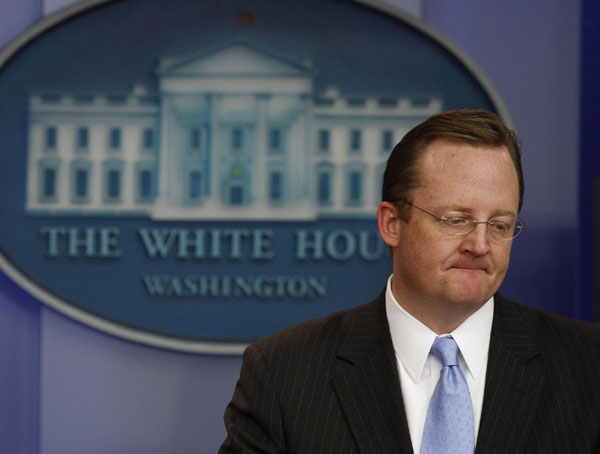Newsmaker
White House press secretary resigning
Updated: 2011-01-06 14:39
(Agencies)
|
 White House Press Secretary Robert Gibbs pauses at the daily press briefing in Washington January 5, 2011. Gibbs, one of President Barack Obama's top advisers, is resigning to become an outside political adviser for Obama's re-election campaign as part of a major staff shake-up. Gibbs, 39, a fierce loyalist and defender of the president during near-daily White House news briefings, will leave in early February, aides said. [Photo/Agencies] |
Gibbs said he would be leaving the White House by early February. The top contenders to replace him are two of his deputies, Bill Burton and Josh Earnest, and Jay Carney, who is communications director to Vice President Joe Biden.
The move allows Gibbs to leave the grinding pace of the press secretary's job, make money giving speeches and spend more time with his family. From the outside, he will still be a key voice in Obama's decision-making, and he will end up back in a pivotal role in Obama's campaign for a second term.
The move will also change the dynamic of the White House, particularly combined with the coming departure of senior adviser David Axelrod, who, like Gibbs, has been at Obama's side for his entire presidential run. Obama is losing daily proximity to two of the aides who best know the way he thinks and who remember personally all the pledges of the campaign.
In a statement, Obama described Gibbs as a friend and one of his closest advisers.
"I think it's natural for him to want to step back, reflect and retool," the president said. "That brings up some challenges and opportunities for the White House - but it doesn't change the important role that Robert will continue to play on our team."
To the world outside of Washington's insular political scene, Gibbs is the rare White House staff member who is considered a familiar face. His sparring with reporters during his press briefings have filled hours of television the last two years.
Gibbs, 39, expressed huge gratitude for getting to serve in the White House. "Over the course of the next two years, we're going to be involved in discussions about which direction to take this country, and in 2012, we'll have a presidential election," he said. "I don't have any fears that there won't be plenty of roles (for himself) outside of the White House."
Obama is also weighing a change at the top staff job at the White House and perhaps in all of politics: his chief of staff. The interim holder of that job, Pete Rouse, may leave soon, and the president is considering bringing in William Daley, the banking executive and former Commerce secretary under President Bill Clinton.
In the coming days and weeks, Obama is also expected to have a new chief economic adviser, a new senior political counselor, and two new deputy chiefs of staff. Collectively, the moves reflect that change is coming to the White House in ways that will alter the dynamic of the place _ and, in turn, will influence the agenda affecting the nation.
Soon to join the White House staff is David Plouffe, the architect of Obama's presidential campaign, who will essentially replace Axelrod as the top political adviser. Gibbs, in turn, will work out of the private office near the White House that has been used by Plouffe, who has written a book and counseled Obama since the end of the 2008 election.
Gibbs said he and Obama have been discussing the spokesman's departure for a while. "I'm going to continue to help him," Gibbs said, "so he's happy with that."
E-paper

Ear We Go
China and the world set to embrace the merciful, peaceful year of rabbit
Preview of the coming issue
Carrefour finds the going tough in China
Maid to Order
Specials

Mysteries written in blood
Historical records and Caucasian features of locals suggest link with Roman Empire.

Winning Charm
Coastal Yantai banks on little things that matter to grow

New rules to hit property market
The State Council launched a new round of measures to rein in property prices.
